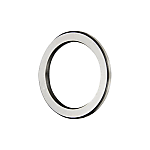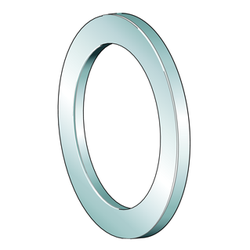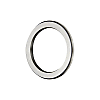(!)NOTE : Windows 7 users won’t be able to use some latest features of eCatalog/WOS since Microsoft is ending support for Windows 7 on 14 Jan, 2020. Please upgrade your system for uninterrupted services.
- Please note that the MISUMI Pune office and warehouse will be closed on November 20th due to the state election.
- Notice of End of Sales for Economy Series Pneumatic Equipment Category. More information.
INA Roller Bearings(Outer Ring:W/o Outer Ring)
INA offers products Roller Bearings specified by Outer Ring W/o Outer Ring from Automation Components product category. There are a total of 1 items. Search and select detailed specifications of parts for your machine with free CAD downloads. INA products are available to order through MISUMI online 24 hours a day. Free shipping, no minimum order.
Brand |
|
|---|---|
| CAD |
|
| Days to Ship |
|
1 items
- Sort By
-
You can add up to 6 items per a category to the compare list.



INA
Can support axial load in one direction only
Inner Dia. d(Ø) Outer Dia. D(Ø) Raceway Ring Shape Load Direction Width B(mm) Outer Ring Number of Raceway Ring Rows Inner/Outer Ring Material Specifications Outer Ring Type Precision (JIS) Rolling Element Material Size Standards 4 ~ 70 14 ~ 95 Needle Roller Thrust 1 ~ 2 W/o Outer Ring Single Row - Standard / Related Part - Class 0 - Metric System From: ₹ 88.00 Days to Ship: 5 Day(s) or more  5 Day(s) or more
5 Day(s) or more
| Brand |
|---|
| Product Series |
| From |
| Days to Ship |
| Inner Dia. d(Ø) |
| Outer Dia. D(Ø) |
| Raceway Ring Shape |
| Load Direction |
| Width B(mm) |
| Outer Ring |
| Number of Raceway Ring Rows |
| Inner/Outer Ring Material |
| Specifications |
| Outer Ring Type |
| Precision (JIS) |
| Rolling Element Material |
| Size Standards |
You can add up to 6 items per a category to the compare list. | |
| Brand | INA |
| Product Series | |
| From | ₹ 88.00- |
| Days to Ship | 5 Day(s) or more |
| Inner Dia. d(Ø) | 4 ~ 70 |
| Outer Dia. D(Ø) | 14 ~ 95 |
| Raceway Ring Shape | Needle Roller |
| Load Direction | Thrust |
| Width B(mm) | 1 ~ 2 |
| Outer Ring | W/o Outer Ring |
| Number of Raceway Ring Rows | Single Row |
| Inner/Outer Ring Material | - |
| Specifications | Standard / Related Part |
| Outer Ring Type | - |
| Precision (JIS) | Class 0 |
| Rolling Element Material | - |
| Size Standards | Metric System |
Loading...
Configure
Specification/Dimensions
-
Inner Dia. d(Ø)
- 3
- 4
- 5
- 6
- 7
- 8
- 9
- 10
- 12
- 12.7
- 12.700(1/2)
- 13
- 14
- 14.288
- 15
- 16
- 17
- 17.462
- 18
- 19
- 19.05
- 20
- 21
- 21.430
- 21.986
- 22
- 22.225
- 24
- 25
- 25.4
- 26
- 28
- 29
- 30
- 31.75
- 32
- 34.925
- 34.925(1 3/8)
- 35
- 37
- 38
- 38.1
- 40
- 41.275
- 42
- 43
- 45
- 47
- 48
- 50
- 50.8
- 52
- 55
- 57
- 58
- 60
- 62
- 63
- 63.5
- 65
- 67
- 68
- 70
- 72
- 73
- 75
- 77
- 80
- 82
- 85
- 87
- 90
- 92
- 95
- 100
- 102
- 105
- 110
- 112
- 115
- 120
- 122
- 125
- 130
- 132
- 135
- 140
- 145
- 150
- 155
- 160
- 162
- 165
- 170
- 180
- 190
- 195
- 200
- 205
- 220
- 225
- 240
- 245
- 260
- 265
- 280
- 285
- 290
- 300
- 320
- 330
- 340
- 360
- 380
- 400
- 420
- 440
- 460
- 480
-
Outer Dia. D(Ø)
- 6
- 6.5
- 7
- 8
- 9
- 10
- 11
- 12
- 13
- 14
- 15
- 16
- 17
- 17.462(11/16)
- 18
- 19
- 19.05
- 20
- 20.638
- 21
- 22
- 23
- 23.812
- 24
- 25
- 26
- 27
- 28
- 29
- 30
- 30.162
- 31
- 32
- 33
- 33.338
- 34
- 35
- 36
- 37
- 38
- 38.1
- 39
- 40
- 41
- 42
- 43
- 44
- 44.45
- 45
- 45.237
- 45.974
- 47
- 47.625(1 7/8)
- 48
- 49
- 50
- 50.005
- 51
- 52
- 53
- 54
- 55
- 56
- 57
- 58
- 59
- 59.131
- 60
- 61
- 62
- 63
- 64
- 65
- 65.088
- 66
- 66.5
- 67
- 68
- 70
- 71.5
- 72
- 73
- 73.025
- 74
- 75
- 76.2
- 77
- 78
- 80
- 81
- 82
- 83
- 85
- 86
- 88
- 89
- 90
- 92
- 93.264
- 95
- 98
- 100
- 102
- 105
- 108
- 110
- 112.712
- 115
- 117
- 120
- 125
- 127
- 130
- 135
- 137
- 140
- 145
- 150
- 153
- 155
- 160
- 165
- 170
- 173
- 175
- 178
- 180
- 188
- 190
- 200
- 210
- 215
- 220
- 225
- 230
- 240
- 250
- 260
- 270
- 280
- 290
- 300
- 310
- 320
- 340
- 360
- 370
- 380
- 400
- 420
- 440
- 460
- 480
- 500
- 520
- 540
- 560
- 580
- 600
- 620
- 650
- 680
- 700
-
Raceway Ring Shape
- Cylindrical Roller
- Needle Roller
- Cone Roller
- Self-Aligning Roller
- Complex Shape Roller
- One-Way Clutch
-
Load Direction
- Radial
- Thrust
-
Width B(mm)
- 1
- 2
- 2.5
- 2.75
- 3
- 3.5
- 4
- 4.25
- 4.75
- 5
- 5.25
- 5.5
- 5.75
- 6
- 6.5
- 7
- 7.5
- 8
- 8.25
- 8.5
- 9
- 9.5
- 10
- 10.5
- 11
- 11.5
- 11.75
- 12
- 12.5
- 12.7
- 12.700(1/2)
- 13
- 13.25
- 13.5
- 14
- 14.25
- 15
- 15.25
- 15.88
- 16
- 16.25
- 16.637
- 16.764
- 17
- 17.25
- 17.462
- 18
- 18.25
- 18.288
- 19
- 19.05
- 19.25
- 19.75
- 20
- 20.75
- 21
- 21.25
- 21.75
- 22
- 22.25
- 22.75
- 23
- 23.75
- 24
- 24.25
- 24.75
- 25
- 25.25
- 25.4
- 25.40(1)
- 25.650
- 25.654
- 26
- 26.25
- 26.75
- 27
- 27.25
- 28
- 28.25
- 28.75
- 29
- 29.25
- 29.75
- 30
- 30.162
- 30.302
- 30.5
- 31
- 31.5
- 31.75
- 32
- 32.5
- 32.75
- 33
- 33.25
- 33.5
- 34
- 34.5
- 35
- 35.25
- 36
- 37
- 38
- 38.25
- 38.5
- 39
- 40
- 41
- 42
- 42.25
- 42.5
- 43
- 43.5
- 43.75
- 44.5
- 45
- 45.5
- 45.75
- 46
- 46.5
- 47
- 48
- 48.5
- 49
- 49.5
- 50
- 51
- 51.5
- 52
- 53
- 53.5
- 54
- 54.5
- 55
- 56
- 57
- 58
- 59
- 59.5
- 60
- 60.5
- 61
- 61.5
- 62
- 63
- 63.5
- 63.75
- 64
- 65
- 67
- 67.5
- 67.75
- 68
- 69
- 70
- 71.5
- 71.75
- 72
- 73
- 74
- 75
- 76
- 77
- 77.5
- 78
- 79
- 80
- 81.5
- 82
- 83
- 84
- 84.5
- 85
- 86
- 87
- 88
- 90
- 90.5
- 91
- 92
- 93
- 95
- 96
- 97
- 98
- 98.75
- 100
- 102
- 103
- 104
- 106
- 107.75
- 108
- 109
- 110
- 112
- 114
- 115
- 118
- 120
- 121
- 122
- 126
- 127
- 128
- 130
- 132
- 133
- 134
- 135
- 138
- 140
- 144
- 145
- 146
- 148
- 150
- 155
- 157
- 160
- 163
- 165
- 174
- 175
- 176
- 190
- 192
- 200
- 208
-
Outer Ring
- With Outer Ring
- W/o Outer Ring
-
Number of Raceway Ring Rows
-
Inner/Outer Ring Material
- Steel
- Stainless Steel
-
Specifications
-
Outer Ring Type
-
Precision (JIS)
- Class 0
- Class 4
- Class 5
-
Rolling Element Material
-
Size Standards
Narrow search by specifying Manufacturer
Related Categories to Roller Bearings
FAQ Roller Bearings
- Question: What are the different types of roller bearings?
- Answer: The different types of roller bearings are:
1. Cylindrical Roller Bearings: Suitable for moderate-speed operations with high radial-load capacity and moderate thrust loads.
2. Spherical Roller Bearings: Designed to carry heavy axial and radial loads at high speeds, even with misalignment or shaft deflection. Available with cylindrical or tapered bores.
3. Needle Roller Bearings: Feature thin, long rollers for high radial load capacities in limited space and high-speed rotational applications.
4. Tapered Roller Bearings: Support radial and thrust loads, commonly used in automotive wheel hubs, gearboxes, and industrial equipment. Available in inch and metric sizes. These bearings find applications in various industries, including heavy equipment, machinery and manufacturing. - Question: What are the advantages of using roller bearings?
- Answer: Here are some Advantages of roller bearings:
1. Reduced friction for lower starting and running friction, except at very high speeds.
2. Ability to withstand momentary shock loads.
3. Accurate shaft alignment.
4. Low manufacturing cost.
5. Moderate lubricant requirements and low friction.
6. Capability to support both radial and axial loads.
7. Long bearing life.
8. Suitable for mass production with stable quality.
9. Can support combined radial and thrust loads simultaneously. - Question: How do I choose the right roller bearing for my application?
- Answer: Here are some steps to guide you in selecting the appropriate bearing:
1. Load Requirements: Understand the magnitude and direction of the load to determine the appropriate load capacity.
2. Speed: Consider the rotational speed of the application to ensure it aligns with the bearing's capabilities.
3. Environmental Conditions: Evaluate temperature, humidity, and exposure to contaminants to select a bearing that can withstand the operating environment.
4. Bearing Type: Choose from various types like cylindrical, spherical, needle, or tapered roller bearings based on load, speed, and operating conditions.
5. Bearing Material: Select suitable materials such as stainless steel, chrome steel, ceramic, or plastic, considering load, speed, temperature, and environmental factors.
6. Lubrication Needs: Determine lubrication requirements, including type, viscosity, and replenishment intervals, to ensure smooth operation and longevity.
7. Special Features or Requirements: Consider any specific features like seals, shields, precision tolerances, or coatings needed for your application. - Question: Can roller bearings handle axial loads?
- Answer: Yes, Roller bearings can indeed handle axial loads, though most are designed primarily for radial loads. Certain designs, such as cylindrical roller bearings with flanges on both inner and outer rings, and axial spherical roller bearings, are capable of supporting axial loads. However, roller bearings generally have lower axial load capacities compared to radial loads.
- Question: How do I maintain and lubricate roller bearings?
- Answer: The guidelines for maintaining and lubricating roller bearings effectively including
1. Selection of Lubricant: Choose lubricant based on application and environment, such as mineral oil, synthetic oil, or greases like lithium soap or polyalphaolefin.
2. Lubrication Techniques: Utilize methods such as oil drip feed or grease lubrication.
3. Lubrication Schedule: Establish a schedule based on application and environmental factors and regularly inspect bearings for wear and adjust the schedule accordingly.
4. Monitoring Performance: Regularly monitor for signs of issues such as increased vibration, excessive heat, lubricant loss, or contamination and address any problems promptly to prevent premature bearing failure. - Question: What are the signs of roller bearing failure?
- Answer: Signs of roller bearing failure include excessive vibration, increased temperature, noise, lubricant contamination, and friction. Initial indicators often begin with abnormal vibration, progressing to elevated temperature and noise. Contaminated lubricants exacerbate friction, leading to heat generation and eventual failure.
- Question: How long do roller bearings typically last?
- Answer: The lifespan of roller bearings is determined by factors like rotations or operating hours, with fatigue symptoms indicating failure. The L10 life, representing the hours or rotations before 90% of bearings fail, estimates bearing life. Ratings are based on hours at a set speed, influenced by load, speed, lubrication, and conditions. Average roller bearing life is usually 4 to 5 times the L10 life, potentially longer under favorable conditions.
- Question: Can roller bearings be used in extreme temperatures?
- Answer: Roller bearings have differing temperature thresholds depending on their design, lubrication, and operational conditions. Traditional bearings can typically function in temperatures up to 149°C, while specialized high-temperature bearings can endure temperatures up to 450°C. However, excessive heat can decrease efficiency, induce wear and expansion, and compromise seals or grease. It's vital to select appropriate bearings and lubricants tailored to specific applications and environmental conditions to ensure optimal performance and longevity.






How can we improve?
How can we improve?
Thank you for your time.
Your feedback is essential for our continuous improvement
Privacy Policy
Thank you for your cooperation.
Thank you for your time.
Your feedback is essential for our continuous improvement
Please use the inquiry form.
Privacy Policy